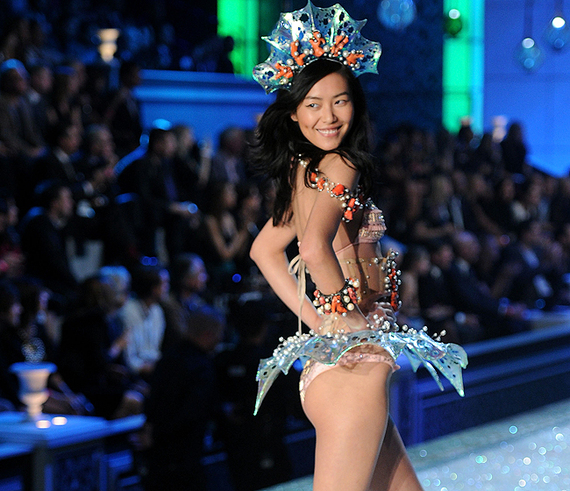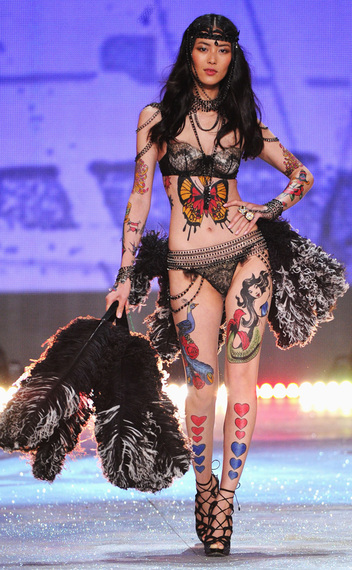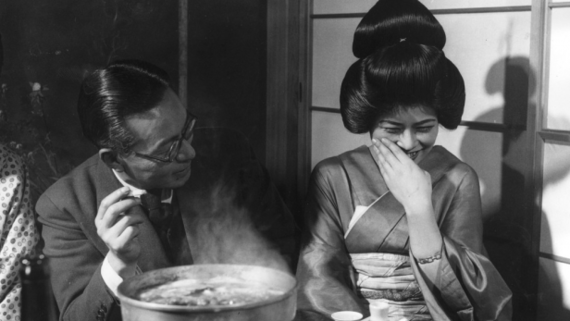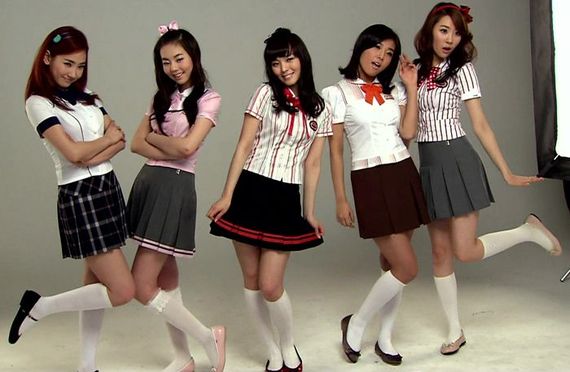Hark, the herald angels sing! On Tuesday, millions of American families huddled around their T.V. sets to watch the world famous Victoria's Secret Angels walk the runway in the 20th annual Victoria Secret Fashion Show. This year's show featured 15 Victoria's Secret Angels, along with dozens of other models parading up and down the catwalk for an audience of 500 million people worldwide. We saw Lily Aldridge in a $2 million fantasy bra, 75 different runway looks, and no women of Asian descent among the 15 Angels - and maybe that's a good thing.
There has been grumbling that the Victoria's Secret Fashion Show does not feature models that represent ethnic minorities. As one writer for VH1 complained: "why isn't anyone else pointing out that after over 15 years, there still aren't more racially diverse ladies representing the brand?" Another writer recently stated that, in "the newest class" of Angels, "there are no Asian models on the list. And as an Asian-American woman, this was deeply disappointing."
Victoria's Secret has rarely featured any models of Asian descent, and there has never been a Victoria's Secret model of "Angel Status" who identifies as Asian or Asian American. When Chinese model Liu Wen appeared in a Victoria Secret fashion show in 2009, she received considerable attention for being the first Asian model on the Victoria's Secret runway - her appearance was hailed as "empowering" for Asian women. But was it really?
While some viewers may find it disappointing that no Asian woman was selected to appear in this year's show to project Victoria's Secret image of the ideal woman, the absence of an Asian woman among the Victoria's Secret Angels is a positive thing for Asian-American female empowerment. Strutting the catwalk in tight underwear, towering high-heels, and eight-foot plastic wings would be more crippling than empowering, because Asian women have been objectified and fetishized for centuries.
To understand this phenomenon, one does not have to look any further than the dramatic portrayals of Asian women in such popular works as Madame Butterfly and Miss Saigon. Puccini's opera Madame Butterfly portrays a Japanese woman who kills herself after marrying an unfaithful American naval officer. The musical Miss Saigon was also written by a white man, and updates the Madame Butterfly story to the Vietnam War in the 1970s, where a Vietnamese prostitute falls in love with a U.S. marine and kills herself when he rejects her.
These and other popular portrayals of Asian women as dragon ladies, "China dolls," geishas, bar hostesses and hula dancers promote the idea that Asian women are objects that exist only to submit to and please white men. Indeed, the pervasively toxic stereotypes of Asian women in modern culture have a lot to do with the remarkable absence of Asian women in positions of power, and the equally rare sightings of positive portrayals of Asian women in mainstream media. There is only one Asian business women on the Forbes list of "The World's 100 Most Powerful Women," Asian-American women fill only 0.2% of the CEO positions in the United States, and there has never been an Asian-American woman on the U.S. Supreme Court.
While it might be argued that an Asian model's induction into the Victoria's Secret pantheon of Angels would be a positive development because any mainstream popular exposure is better than none, this is not the case when popular portrayals perpetuate harmful stereotypes. Even if the Angels in the Victoria's Secret show represent the pinnacle of the international modeling profession, the chosen few do not represent power in any constructive, positively affirming sense of that word. The Victoria's Secret Angels are exhibited on stage for (predominately male) viewing pleasure. The Victoria's Secret Angels cater to, and are objects of, male fantasy, and the presence of an Asian model on the runway would only reinforce the harmful stereotypes that already surround popular perceptions of Asian women's marginalized status, fetishization, and submissiveness. Thus, let's have the battle for the representation of Asian women in the boardrooms of powerful companies and other traditional corridors of power, not on the Victoria's Secret runway.



